Items filtered by date: July 2025
Keep Your Feet Healthy So You Can Stay Active
What You Need to Know About Foot Sprains
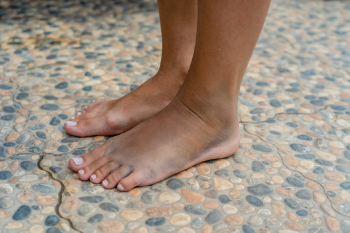
A foot sprain is a common injury that occurs when the ligaments supporting the bones in the feet are stretched or torn. This type of injury is often due to the sudden twisting of the body while the feet stay in place. A foot sprain typically happens during sports and other activities, such as football, snowboarding, and dance. Symptoms of a foot sprain include pain, tenderness, bruising, swelling, and difficulty walking or standing on your toes. Severe foot sprains can make it hard to put weight on the injured foot. If that is the case, a podiatrist may recommend using a splint or crutches to protect the foot while it heals and help prevent further injury. If you suspect you have sprained your foot, it is suggested that you promptly consult a podiatrist for an accurate diagnosis and a guided recovery plan.
Foot Pain
Foot pain can be extremely painful and debilitating. If you have a foot pain, consult with Brandon M. Zuklie, DPM from New Jersey. Our doctor will assess your condition and provide you with quality foot and ankle treatment.
Causes
Foot pain is a very broad condition that could be caused by one or more ailments. The most common include:
- Bunions
- Hammertoes
- Plantar Fasciitis
- Bone Spurs
- Corns
- Tarsal Tunnel Syndrome
- Ingrown Toenails
- Arthritis (such as Gout, Rheumatoid, and Osteoarthritis)
- Flat Feet
- Injury (from stress fractures, broken toe, foot, ankle, Achilles tendon ruptures, and sprains)
- And more
Diagnosis
To figure out the cause of foot pain, podiatrists utilize several different methods. This can range from simple visual inspections and sensation tests to X-rays and MRI scans. Prior medical history, family medical history, and any recent physical traumatic events will all be taken into consideration for a proper diagnosis.
Treatment
Treatment depends upon the cause of the foot pain. Whether it is resting, staying off the foot, or having surgery; podiatrists have a number of treatment options available for foot pain.
If you have any questions, please feel free to contact our offices located in Piscataway, Jamesburg, and Branchburg, NJ . We offer the newest diagnostic and treatment technologies for all your foot care needs.
How Athlete’s Foot Spreads and Why It Matters
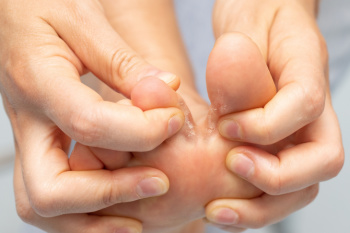
Athlete’s foot is a common fungal infection that affects the skin, usually between the toes. It often begins with itching, burning, or peeling and can spread quickly in warm, moist environments. Locker rooms, shared showers, and damp socks create perfect conditions for this infection to thrive. Athlete’s foot is contagious. It can be passed through direct skin contact or by walking barefoot on contaminated surfaces. Sharing shoes, towels, or even carpets with someone who has it increases the risk. The fungus can also spread to other parts of the body if not treated properly. Because it can be persistent and easily transmitted, early treatment is essential. If symptoms continue or return, it is suggested that you see a podiatrist for an accurate diagnosis and stronger options to prevent spreading or recurrence.
Athlete’s foot is an inconvenient condition that can be easily reduced with the proper treatment. If you have any concerns about your feet and ankles, contact Brandon M. Zuklie, DPM from New Jersey. Our doctor will treat your foot and ankle needs.
Athlete’s Foot: The Sole Story
Athlete's foot, also known as tinea pedis, can be an extremely contagious foot infection. It is commonly contracted in public changing areas and bathrooms, dormitory style living quarters, around locker rooms and public swimming pools, or anywhere your feet often come into contact with other people.
Solutions to Combat Athlete’s Foot
- Hydrate your feet by using lotion
- Exfoliate
- Buff off nails
- Use of anti-fungal products
- Examine your feet and visit your doctor if any suspicious blisters or cuts develop
Athlete’s foot can cause many irritating symptoms such as dry and flaking skin, itching, and redness. Some more severe symptoms can include bleeding and cracked skin, intense itching and burning, and even pain when walking. In the worst cases, Athlete’s foot can cause blistering as well. Speak to your podiatrist for a better understanding of the different causes of Athlete’s foot, as well as help in determining which treatment options are best for you.
If you have any questions please feel free to contact our offices located in Piscataway, Jamesburg, and Branchburg, NJ . We offer the newest diagnostic and treatment technologies for all your foot and ankle needs.
Understanding the Achilles Tendon
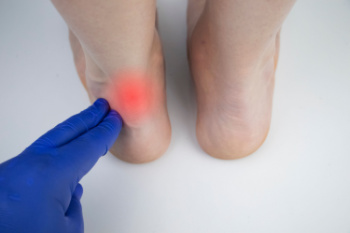
The Achilles tendon is the thick band of tissue that connects the calf muscles to the heel bone. It plays a key role in walking, running, and jumping by allowing the foot to push off the ground. Located at the back of the lower leg, it is the strongest tendon in the body, yet it is still vulnerable to injury. Tight calf muscles, poor footwear, or sudden increases in activity can place too much strain on this tendon. Common issues include inflammation, known as tendonitis, or small tears that can worsen over time. In more severe cases, the tendon may rupture, causing sharp pain and difficulty walking. Early care can prevent further damage and improve healing. If you are experiencing stiffness, swelling, or pain along the back of your leg near the heel, it is suggested that you see a podiatrist for evaluation and appropriate care.
Achilles tendon injuries need immediate attention to avoid future complications. If you have any concerns, contact Brandon M. Zuklie, DPM of New Jersey. Our doctor can provide the care you need to keep you pain-free and on your feet.
What Is the Achilles Tendon?
The Achilles tendon is a tendon that connects the lower leg muscles and calf to the heel of the foot. It is the strongest tendon in the human body and is essential for making movement possible. Because this tendon is such an integral part of the body, any injuries to it can create immense difficulties and should immediately be presented to a doctor.
What Are the Symptoms of an Achilles Tendon Injury?
There are various types of injuries that can affect the Achilles tendon. The two most common injuries are Achilles tendinitis and ruptures of the tendon.
Achilles Tendinitis Symptoms
- Inflammation
- Dull to severe pain
- Increased blood flow to the tendon
- Thickening of the tendon
Rupture Symptoms
- Extreme pain and swelling in the foot
- Total immobility
Treatment and Prevention
Achilles tendon injuries are diagnosed by a thorough physical evaluation, which can include an MRI. Treatment involves rest, physical therapy, and in some cases, surgery. However, various preventative measures can be taken to avoid these injuries, such as:
- Thorough stretching of the tendon before and after exercise
- Strengthening exercises like calf raises, squats, leg curls, leg extensions, leg raises, lunges, and leg presses
If you have any questions please feel free to contact our offices located in Piscataway, Jamesburg, and Branchburg, NJ . We offer the newest diagnostic tools and technology to treat your foot and ankle needs.
Morton's Neuroma and Surgical Relief
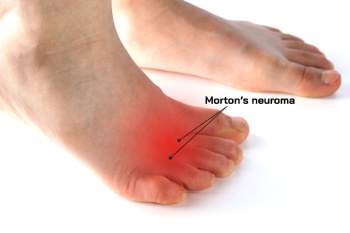
Morton's neuroma is a nerve condition that occurs when tissue thickens around a nerve, usually between the third and fourth toes. This can cause pain, tingling, burning, or the sensation of something being stuck underfoot. It is often linked to wearing narrow shoes, repetitive stress, or abnormal foot mechanics. When noninvasive treatments do not relieve symptoms, surgery may be considered to remove the affected nerve or release surrounding structures. Surgical treatment can provide lasting relief and restore comfort while walking. A podiatrist can evaluate your symptoms and provide information about this type of surgery. If you have pain in this part of your foot, it is suggested you schedule an appointment with a podiatrist for expert care and relief.
Morton’s neuroma is a very uncomfortable condition to live with. If you think you have Morton’s neuroma, contact Brandon M. Zuklie, DPM of New Jersey. Our doctor will attend to all of your foot care needs and answer any of your related questions.
Morton’s Neuroma
Morton's neuroma is a painful foot condition that commonly affects the areas between the second and third or third and fourth toe, although other areas of the foot are also susceptible. Morton’s neuroma is caused by an inflamed nerve in the foot that is being squeezed and aggravated by surrounding bones.
What Increases the Chances of Having Morton’s Neuroma?
- Ill-fitting high heels or shoes that add pressure to the toe or foot
- Jogging, running or any sport that involves constant impact to the foot
- Flat feet, bunions, and any other foot deformities
Morton’s neuroma is a very treatable condition. Orthotics and shoe inserts can often be used to alleviate the pain on the forefront of the feet. In more severe cases, corticosteroids can also be prescribed. In order to figure out the best treatment for your neuroma, it’s recommended to seek the care of a podiatrist who can diagnose your condition and provide different treatment options.
If you have any questions, please feel free to contact our offices located in Piscataway, Jamesburg, and Branchburg, NJ . We offer the newest diagnostic and treatment technologies for all your foot care needs.
Protecting Your Feet from Diabetic Complications
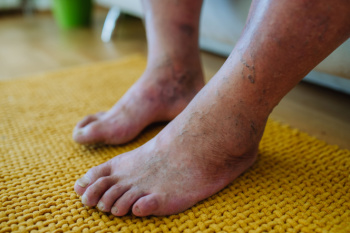
Diabetes can cause nerve damage, known as neuropathy, and poor circulation, leading to decreased sensation and slower healing in the feet. This makes it easier to develop unnoticed cuts, blisters, or infections, which can worsen without proper care. Symptoms include numbness, tingling, burning sensations, dry or cracked skin, swelling, and slow-healing wounds. Feet may appear discolored, swollen, or have ulcers, which can be painless due to nerve damage, but are at high risk for infection. A podiatrist can diagnose diabetic foot problems with a thorough foot exam, assessing circulation and nerve function. Treatment focuses on preventing complications through regular foot care, wound management, custom orthotics, and education on proper hygiene and footwear. If you have diabetes, it is suggested that you schedule regular appointments with a podiatrist for ongoing care.
Diabetic foot care is important in preventing foot ailments such as ulcers. If you are suffering from diabetes or have any other concerns about your feet, contact Brandon M. Zuklie, DPM from New Jersey. Our doctor can provide the care you need to keep you pain-free and on your feet.
Diabetic Foot Care
Diabetes affects millions of people every year. The condition can damage blood vessels in many parts of the body, especially the feet. Because of this, taking care of your feet is essential if you have diabetes, and having a podiatrist help monitor your foot health is highly recommended.
The Importance of Caring for Your Feet
- Routinely inspect your feet for bruises or sores.
- Wear socks that fit your feet comfortably.
- Wear comfortable shoes that provide adequate support.
Patients with diabetes should have their doctor monitor their blood levels, as blood sugar levels play such a huge role in diabetic care. Monitoring these levels on a regular basis is highly advised.
It is always best to inform your healthcare professional of any concerns you may have regarding your feet, especially for diabetic patients. Early treatment and routine foot examinations are keys to maintaining proper health, especially because severe complications can arise if proper treatment is not applied.
If you have any questions, please feel free to contact our offices located in Piscataway, Jamesburg, and Branchburg, NJ . We offer the newest diagnostic and treatment technologies for all your foot care needs.

